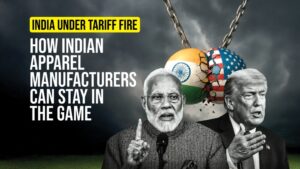
India, in its first countermeasure to US President Donald Trump’s 50% tariff on Indian goods, has announced dedicated outreach programmes in 40 key markets, including the UK, Japan and South Korea, to boost textile exports, an official said on Wednesday.
The targeted push will also extend to Germany, France, Italy, Spain, the Netherlands, Poland, Canada, Mexico, Russia, Belgium, Turkey, the UAE and Australia. According to the official, each of these 40 markets will see a targeted approach positioning India as a reliable supplier of quality, sustainable and innovative textile products, with the Indian industry, Export Promotion Councils (EPCs) and Indian Missions abroad playing lead roles.
While India currently exports to over 220 countries, officials noted that 40 select markets hold the key to diversification. These countries together import over US $ 590 billion worth of textiles and apparel annually, yet India’s market share remains only around 5–6%. Recognising this, the Government is planning dedicated outreach in both traditional and emerging markets.
EPCs are expected to play a central role in this diversification strategy. They will conduct market mapping, identify high-demand products and connect clusters such as Surat, Panipat, Tirupur and Bhadohi with opportunities in the 40 target countries.
They will also enhance India’s visibility at global trade fairs, exhibitions and buyer-seller meets, while driving sector-specific campaigns under a unified Brand India identity. Additionally, they will guide exporters on leveraging free trade agreements (FTAs), meeting sustainability standards and obtaining necessary certifications. Officials said FTAs and negotiations with several of these geographies would help Indian exports remain competitive, offering strong growth potential.
The textile and apparel sector in India is projected to reach US $ 179 billion in 2024–25, including a domestic market of US $ 142 billion and exports worth US $ 37 billion. Globally, the import market for textiles and apparel stood at US $ 800.77 billion in 2024, with India holding a 4.1% share as the sixth-largest exporter.
Mithileshwar Thakur, Secretary General of the Apparel Export Promotion Council (AEPC), said the additional tariff has created a 30–31% cost disadvantage for India compared to competitors such as Bangladesh, Vietnam and Sri Lanka.
The commerce ministry is also set to meet exporters from affected sectors—including textiles—this week to explore measures to reduce the tariff impact. Work is also underway on the proposed Export Promotion Mission (Budget 2025–26), which officials said will act as a long-term framework for market diversification.






